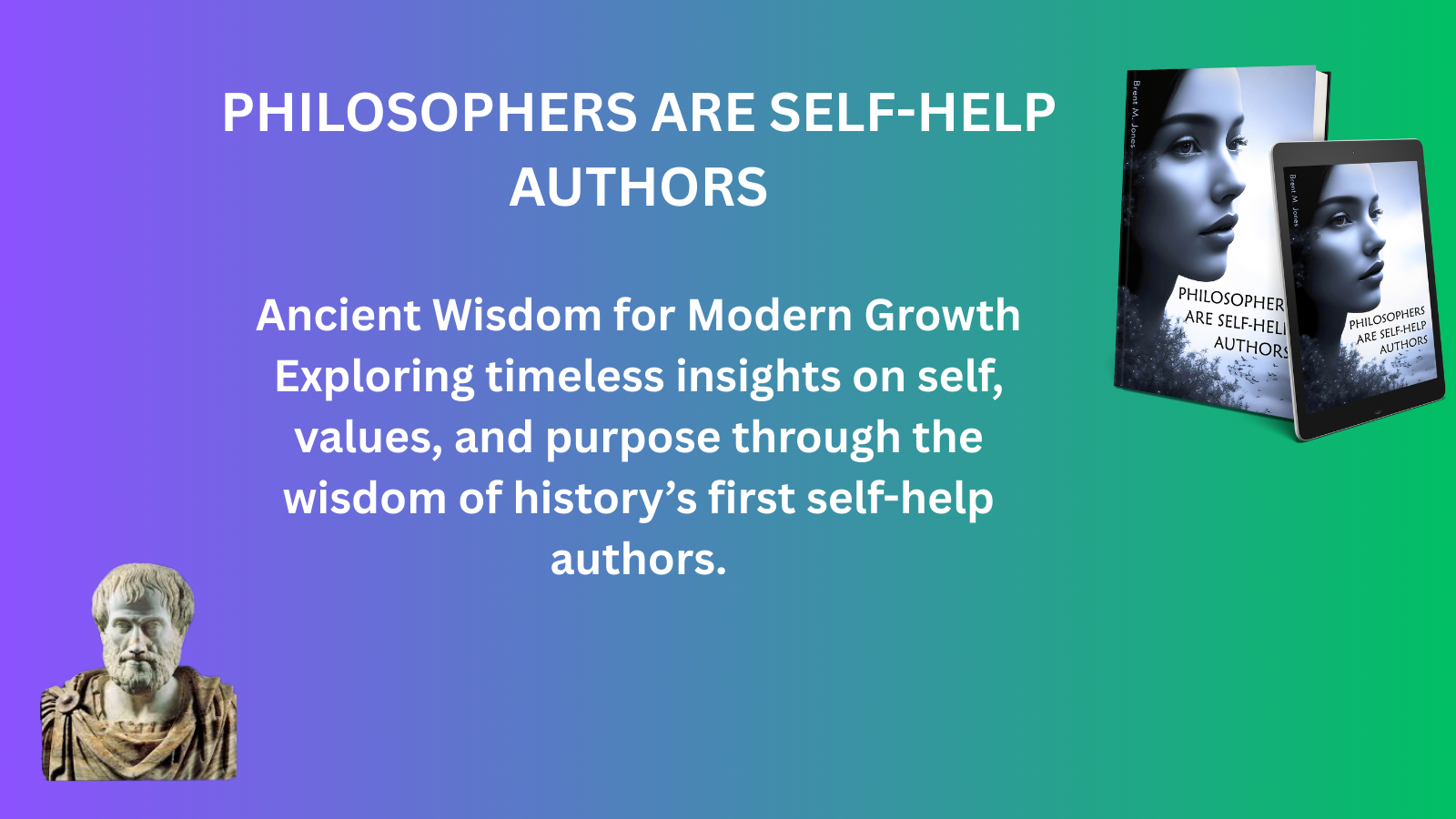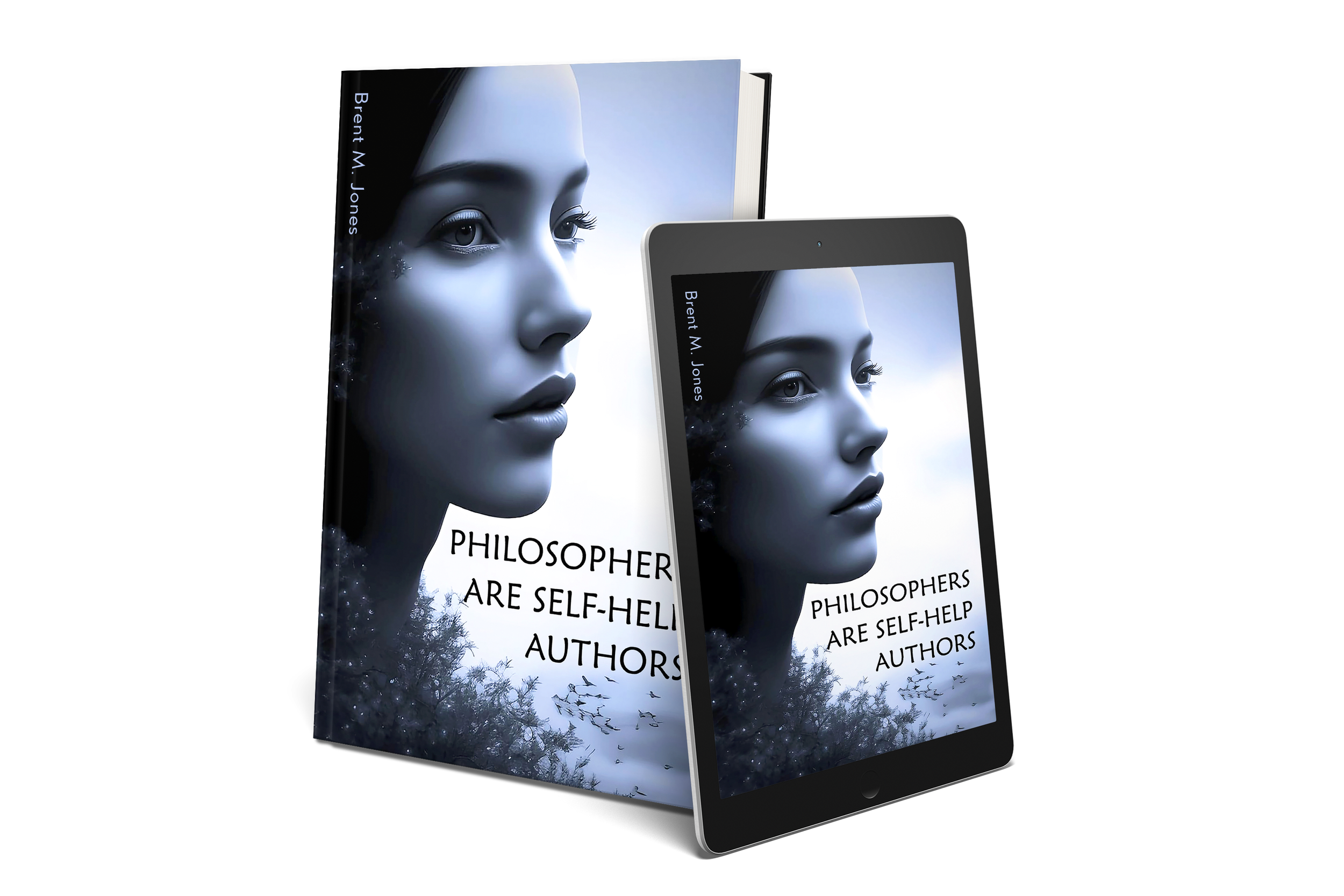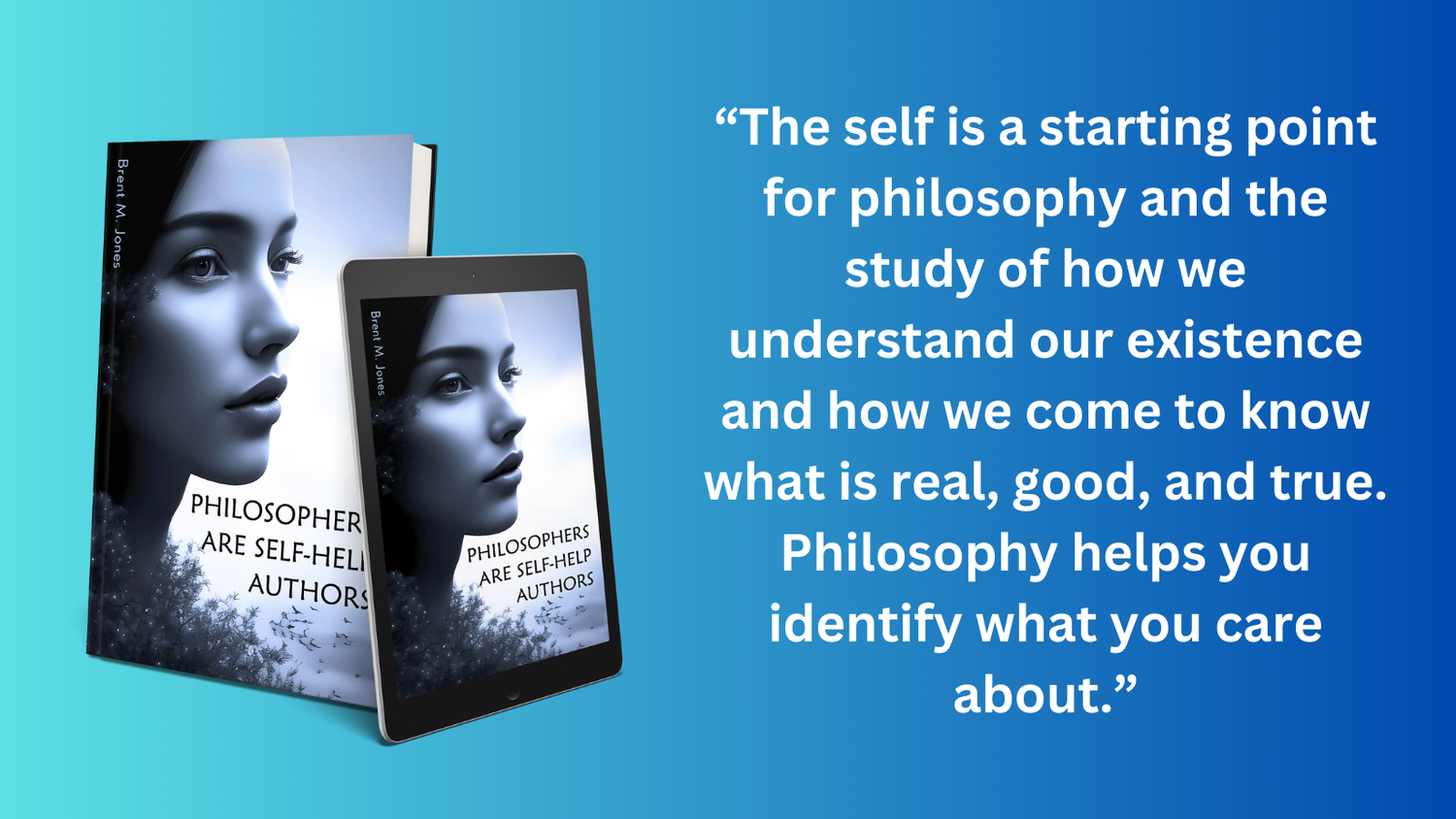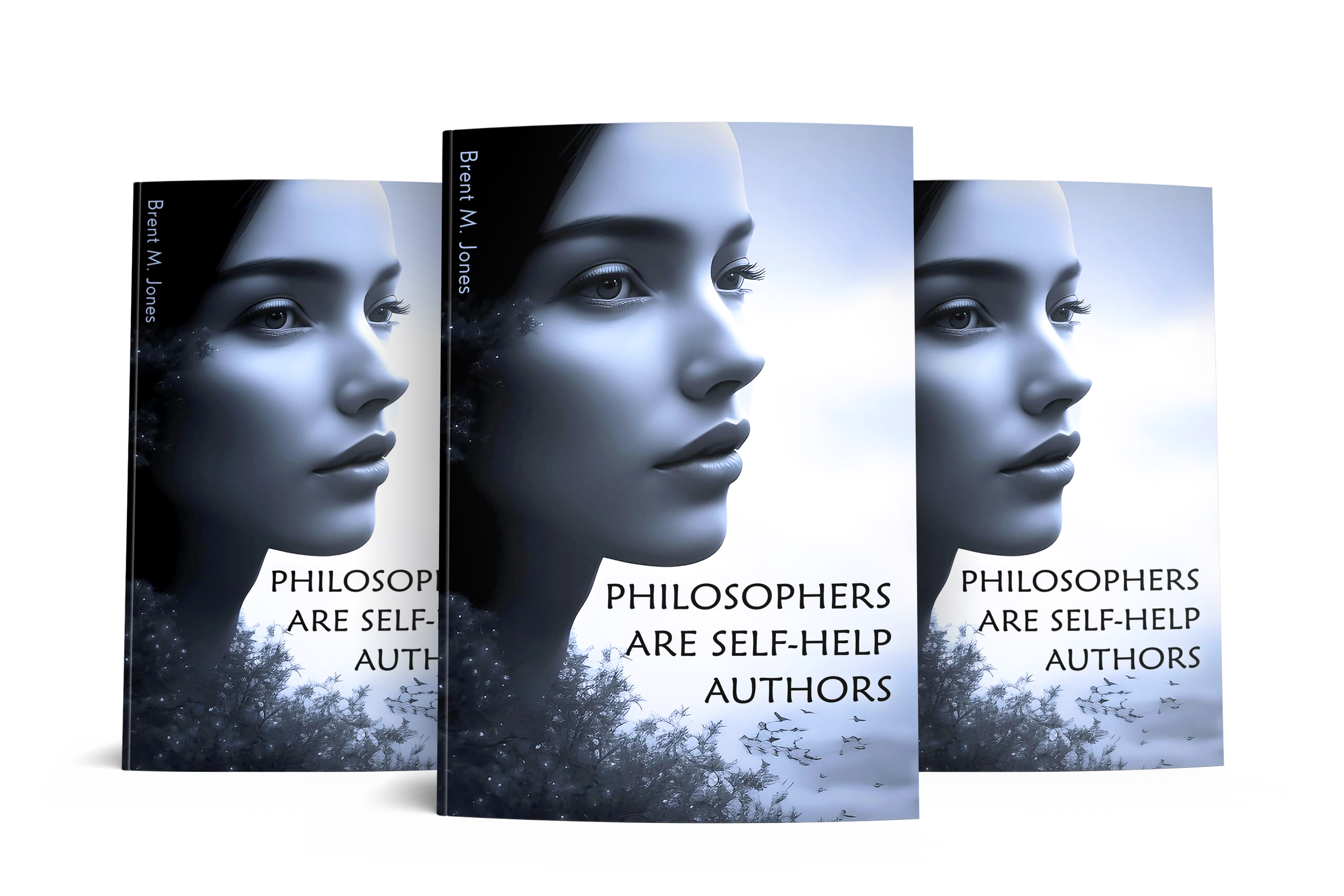Reader Reviews for Philosophers Are Self-Help Authors: What Readers Are Saying About the Wisdom Within
Philosophers Are Self-Help Authors shows that the wisdom of Socrates, Aristotle, and the Stoics still speaks to today’s search for clarity, resilience, and purpose. This book invites readers to rediscover timeless insights from the world’s greatest thinkers—and apply them to modern challenges in personal and career growth.
Here’s what early readers are saying about its concise, practical, and lasting wisdom:
Reviews of This Book
Many2luv
4 out of 5 stars - Nice little book!
Reviewed in the United States on March 26, 2024
The book is small, but that's not a bad thing. We are seeing authors skip the fluff and get straight to the meat more and more, and Jones does exactly that! This book is packed with interesting points that will bring new ideas to your perspective.
Editorial Review
"A thoughtful and timely reminder that the roots of personal growth run deeper than we think."
In Philosophers Are Self-Help Authors, Brent M. Jones invites readers on a journey that bridges the ancient and the modern, showing how the wisdom of historical thinkers continues to shape the way we pursue purpose, clarity, and emotional resilience today. Rather than offering trendy tips or empty affirmations, Jones draws from the Stoics, virtue ethics, and other classical traditions to uncover the original intent behind what we now call "self-help."
This book is concise yet impactful—stripped of filler and rich in insight. With references to both timeless philosophy and modern-day challenges, Jones challenges readers to reflect more deeply, think more clearly, and live more intentionally.
For anyone seeking meaningful change grounded in enduring truths, Philosophers Are Self-Help Authors is a refreshing and intelligent guide.
Carlos
5.0 out of 5 stars Timeless self-help wisdom from ancient philosophers
Reviewed in the United States on January 19, 2024
Verified Purchase
This book is not just a captivating exploration of timeless insights from ancient philosophers. It's a transformative journey that takes you back to the roots of self-help, filled with profound, age-old wisdom. This book uniquely bridges the gap between ancient philosophy and modern self-improvement, leaving a lasting impact on your life guidance. It's a treasure trove for anyone seeking genuine, enduring transformation.
Philosophy, the Self, and the Role of Self-Help →
The self is a starting point for philosophy and the study of how we understand our existence. Philosophers have long explored what it means to be human, how we perceive reality, and how we define concepts like truth, meaning, and morality. These aren’t just abstract questions—they are deeply personal ones. Understanding the self is essential for making sense of our choices, relationships, and goals.
In many ways, self-help books serve a similar function. They aren’t just about improving productivity or changing habits; they are tools for self-exploration. By using real-world examples, reflective questions, and emotionally resonant narratives, self-help writing offers practical philosophy. It helps people understand themselves in the context of their lives—something that academic philosophy has often made less accessible.
When a book helps you see your patterns more clearly or name what you’ve been feeling, it’s not unlike philosophy helping you identify what you care about. At its best, self-help is not a shortcut to happiness, but a structured way of asking timeless philosophical questions: Who am I? What do I value? How can I live better?
Understanding the Self
The self is often considered a foundational concept in philosophy. Many philosophical inquiries begin with questions about the nature of the self, consciousness, and identity. Understanding the self is seen as crucial for understanding ethics, morality, knowledge, and reality itself.
Self-help books are not just about changing how you live, they are about understanding your unique journey. They use facts and anecdotes that resonate with your experiences to make their argument more relatable and understandable.
Overview: Philosophers Are Self-Help Authors →
Overview: Philosophers Are Self-Help Authors
Ancient Wisdom for Modern Growth
In a world crowded with self-help books promising quick fixes and instant happiness, it's easy to forget that the foundations of personal growth were laid long ago—by philosophers.
As the book’s introduction explains:
“The self is a starting point for philosophy and the study of how we understand our existence and how we come to know what is real, good, and true. Philosophy helps you identify what you care about. With this direction, the individual’s self-efficacy increases.”
This book explores the powerful overlap between philosophy and personal development. While today’s self-help authors offer techniques and inspiration, Philosophers Are Self-Help Authors takes readers back to the timeless insights of thinkers like Socrates, Epictetus, Seneca, and others—who long before the term “self-help” existed, taught people how to live intentionally, think clearly, and act with purpose.
As quoted from Chapter One:
“The world of self-help literature has experienced a significant surge in popularity in recent decades. People have sought guidance, motivation, and techniques to lead happier, more fulfilling lives. While modern self-help authors have made significant contributions to this genre, it is essential to recognize that the roots of self-help and personal development extend far back into antiquity.”
And from the back cover:
“In a world dominated by the bustling industry of self-help literature, where promises of happiness and fulfillment are packaged in countless books and seminars, it’s easy to overlook the profound insights that have existed for centuries.”
This book invites you to rediscover those enduring truths—and to see ancient philosophers not only as intellectual giants, but as some of the earliest and most impactful self-help authors in history.
Why It Matters That Ancient Philosophers Were the First Self-Help Authors →
Philosophers are Self-Help Authors
Why It Matters That Ancient Philosophers Were the First Self-Help Authors
June 12, 2024 | Brent M. Jones
Philosophers Are Self-Help Authors
Some critics dismiss self-help books as vehicles for “false hope syndrome”—a cycle of unrealistic expectations, repeated setbacks, and eventual disillusionment. It’s a common accusation: that self-help promotes quick fixes to complex problems, offering generic advice without addressing the depth of real change.
While that skepticism isn’t without merit, it overlooks an important truth: much of what we now call self-help is deeply rooted in timeless, thoughtful traditions. In fact, the world’s earliest self-help thinkers were philosophers.
Ancient Wisdom, Modern Application
Stoic philosophers, for example, taught negative visualization—the practice of imagining loss to heighten gratitude. This technique, now echoed in modern psychology, was never about naïve optimism. It was about building emotional resilience.
Similarly, virtue ethics, a concept from Aristotle and others, encouraged individuals to develop character traits that lead to a good and meaningful life. Their advice wasn’t theoretical—it was practical, personal, and purpose-driven. They didn’t write for an audience of scholars. They wrote for people trying to live better lives.
Ancient philosophy wasn’t about vague speculation—it was about how to live well. In this sense, these philosophers were the original self-help authors.
From Skepticism to Credibility
Today, many remain skeptical of self-help books, questioning the credibility of the authors or the validity of their advice. Yet much of the guidance found in quality self-help literature is grounded in psychological research, lived experience, and timeless principles.
As evidence of this shift in perception, Oxford University Press began publishing its Guides to the Good Life series in 2020—short, accessible volumes that draw practical wisdom from traditions such as Buddhism, Stoicism, Epicureanism, Confucianism, and even Kant. These books aren’t gimmicks; they’re serious reflections on how to live meaningfully.
The growing acceptance of philosophy as practical self-help strengthens the case that this genre, when done well, is not only legitimate—it’s essential.
Why I Wrote Philosophers Are Self-Help Authors
In my book Philosophers Are Self-Help Authors, I offer an approachable introduction to the wisdom of ancient thinkers—wisdom that still applies today. These ideas aren’t built on false hope. They’ve stood the test of time and continue to guide people seeking a more grounded, intentional, and fulfilling life.
This book is more than a historical reflection. It’s a guide for personal and career development, rooted in proactive, principle-based growth. By reconnecting with the original intent behind philosophy, we can reclaim self-help as a thoughtful, empowering, and enduring pursuit.
Self-help, when grounded in values and reason, isn’t just worthwhile. It’s necessary.
Chapter Highlight: Socratic Irony and the Strategy of Feigned Ignorance
Chapter Highlight: Socratic Irony and the Strategy of Feigned Ignorance
From the book: Philosophers Are Self-Help Authors by Brent M. Jones
Did Socrates fake ignorance… on purpose?
Chapter 2 explores the concept of Socratic irony—a rhetorical method where Socrates would pretend not to know the answer in order to encourage deeper thought from others. At its best, this approach created a space for meaningful dialogue, inviting others to articulate and defend their beliefs.
But feigned ignorance wasn’t always used so nobly. Even in ancient times, it could be a strategy for manipulation—used to avoid accountability, confuse the conversation, or gain the upper hand in negotiation. It reminds us that wisdom and persuasion often walk a fine line.
Understanding this duality gives us a deeper appreciation of how communication, then and now, can both enlighten and influence. As we examine the roots of self-help and personal growth, it becomes clear that some of the tools we use today were already in the hands of philosophers centuries ago.
📘 Explore more in Philosophers Are Self-Help Authors —available now on Amazon.
Philosophers Are Self-Help Authors
Philosophers Are Self-Help Authors
Preface
In a world dominated by the bustling industry of self-help literature, where promises of happiness and fulfillment are packaged in countless books and seminars, it's easy to overlook the profound insights that have existed for centuries. "Unlocking Ancient Wisdom" is a journey into the hidden treasure troves of the past, where the earliest self-help authors resided-philosophers of antiquity.
This groundbreaking book delves deep into the essence of philosophy, uncovering its roots as the original guide to self-discovery and personal development. While modern self-help authors have contributed significantly to this genre, it's essential to recognize that the foundations of self-help stretch back into the annals of history. "Unlocking Ancient Wisdom" reveals the timeless relevance of these early self-help f authors, offering a transformative roadmap to navigate the complexities of life. Your journey through this book will deepen your understanding of the self and increase your self-efficacy, equipping you with the tools to identify what truly matters in your life.
Join us on a voyage to unlock the ancients' secrets and embark on a path toward a more fulfilling, purpose-driven life. Discover the genuine, unadulterated wisdom of philosophers who unknowingly became the original self-help guides for humanity
The Self is a Starting Point for Philosophy →
PHILOSOPHERS ARE SELF-HELP AUTHORS
The world of self-help literature has experienced a significant surge in popularity in recent decades. People have sought guidance, motivation, and techniques to lead happier, more fulfilling lives. While modern self-help authors have made significant contributions to this genre, it is essential to recognize that the roots of self-help and personal development extend back into antiquity.
Read morePhilosophers are Self-Help Authors - About the Book
Philosophers are Self-Help Authors















